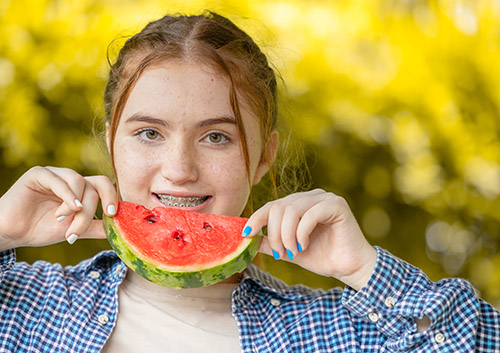Braces-Friendly Recipe: Lunch
November 19th, 2025

Getting braces comes with a lot of rules. No sticky candies, watch out for popcorn, and steer clear of chips. These rules leave many braces-wearers wondering what they can still eat without hurting their teeth or their expensive orthodontic appliances. Fortunately, constructing a braces-friendly lunch is straightforward once you know which foods to avoid.
Foods to Avoid When Wearing Braces
There are a few food categories to avoid when you have braces. Sticky foods also stick to the metal in your braces, and can potentially break wires or individual braces. For example: bubblegum, candy bars, caramel, licorice, fruit roll-ups, and Starbursts should be avoided. Many of these foods also contain high levels of sugar, which can cause plaque build-up if not brushed away properly.
Also, be wary of hard foods that can harm your orthodontic appliances. Avoid eating hard taco shells, chips, Rice Crispy treats, hard candy, beef jerky, and popcorn. Some healthy foods, such as carrots, apples, corn on the cob, and nuts, are hard on braces. To eat these foods safely, cut them into smaller pieces before eating.
Remember that certain habits may be harmful to your braces. For example, crunching on ice cubes may be a reflexive response when you’re enjoying a cold beverage, but this can significantly harm your braces and extend treatment time. To stay on the safe side, Dr. Neil Oliveira and Dr. Derek Wolkowicz and our team at Orthodontic Specialists of Southeastern Massachusetts recommend you drink beverages without ice or add crushed ice whenever possible.
Lunch Recipe
Even with braces, it’s easy to enjoy a healthy, nutritious lunch. For example, make a panini on whole wheat bread with slices of turkey deli meat, a piece of Swiss cheese, and tomato slices. Spread 1 tbsp. of mustard or mayonnaise on the bread before toasting the sandwich in a panini grill. Serve the panini with ½ c. low-fat cottage cheese and a sliced pear or apple for a balanced meal. Then grab a pudding cup or some JELLO for dessert. Wash it all down with water containing a lemon wedge or all-natural fruit juice. Make sure to brush your teeth or rinse with mouthwash after lunch to wash away sugars and food residue that can get trapped in braces and cause decay.
If you have any questions about what you can and can’t eat with braces during your treatment at Orthodontic Specialists of Southeastern Massachusetts, be sure to ask our team during your next appointment at our New Bedford or Mattapoisett, MA office!



